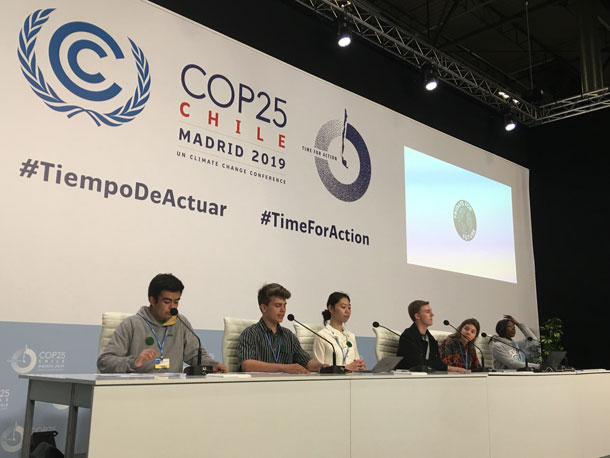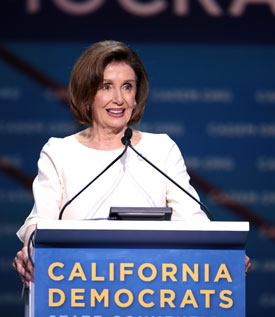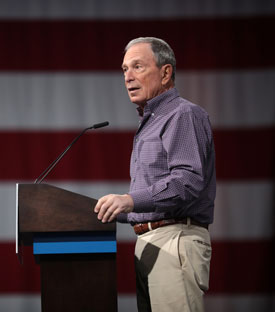Democrats "Still In" at Madrid Climate Talks
Air Date: Week of December 13, 2019

The 25th Conference of the Parties featured panels throughout two weeks of meetings, including this one with student activists from the Fridays for Future movement. (Photo: John Englart, Flickr, CC BY-SA 2.0)
The latest UN climate talks, known as COP25, just wrapped up in Madrid, Spain. And in the wake of Republican President Trump officially beginning the process to pull the U.S. out of the Paris Agreement, a new vanguard of U.S. Democratic politicians with a climate agenda is saying “We Are Still In”. Speaker of the House Nancy Pelosi (D-CA) led a delegation of Democratic members of Congress, and Democratic Presidential candidate and former UN Special Climate Envoy Michael Bloomberg spoke about the “America’s Pledge” initiative. Living on Earth’s Aynsley O’Neill reports on the U.S. presence at the Madrid climate talks and on the debate over using carbon markets to curb global emissions.
Transcript
CURWOOD: From PRX and the Jennifer and Ted Stanley Studios at the University of Massachusetts Boston, this is Living on Earth, I’m Steve Curwood.
You may recall that back in 2015, some 196 parties under the UN including the United States, adopted the Paris Climate Agreement, with the aspirational goal of limiting the increase in global temperature to 1.5 degrees centigrade, or at worst, to 2 degrees centigrade to avert climate catastrophe. But the pledges made at the time fell far short of that goal. So nations also agreed to meet yearly to refine the rules and boost ambition, so that by 2020 the world would be on track to protect a livable climate. The most recent round of talks gathered in Madrid, Spain for the 25th Conference of the Parties, also known as COP25, and Living on Earth’s Aynsley O’Neill has more.
O’NEILL: The United States is in an odd position at the Madrid negotiations.
It’s the only nation to give notice of intent to withdraw from the international agreement, although that won’t actually go into effect until the day after the 2020 election.
But a delegation of top Democrats including Speaker of the House, Nancy Pelosi, and several Democratic members of the US Congress, attended the COP in Madrid to communicate one message: that many Americans still support the Paris Agreement.
As current House Speaker, Nancy Pelosi is the highest-ranking member of the Democratic Party, and she’s the second person in the presidential line of succession.

The US Congressional delegation was led by Nancy Pelosi, who as the current Speaker of the US House of Representatives, is the highest-ranking member of the Democratic party. (Photo: Gage Skidmore, Flickr, CC BY-SA 2.0)
She made it known that the congressional delegation’s decision to visit Madrid, even during the impeachment proceedings, showed their commitment to combating the climate emergency.
PELOSI: We’re still in to protect our environment for our children and their future. We’re in because it’s a public health issue: clean air, clean water, food safety. That it’s an economic issue about good-paying green jobs in our economy and throughout the globe. It is a security issue, in terms of natural disasters and the rest, robbing communities of habitat and natural resources, which can, in competition for such things, can cause conflict. And, it is a moral issue.
O’NEILL: Democratic presidential candidate Michael Bloomberg also attended the meeting.
Many consider climate change to be Bloomberg’s defining international issue, one he has been working on as both a politician and a philanthropist.
Mr. Bloomberg attended several UN climate change conferences as the UN’s special envoy for cities and climate change. And he’s donated hundreds of millions of dollars to various environmental causes.
But at this conference, he spoke of his America’s Pledge initiative.
It’s a group of cities, states, and organizations who have all pledged their commitment to the Paris climate goals, despite the Trump Administration’s decision to pull out of the Agreement.
BLOOMBERG: America's Pledge represents 68% of American Gross Domestic Product, 65% of the US population, and more than half of US emissions. Put that another way, if we were our own country, we would have an economy larger than China's or any other nation in the world, except the entire United States itself.

Michael Bloomberg, the former Mayor of New York City who recently announced he was running for president, presented his America’s Pledge report at the Madrid COP. (Photo: Gage Skidmore, Flickr, CC BY-SA 2.0)
O’NEILL: Mr. Bloomberg also talked about what’s missing from federal climate policy, and he tried to assure allies in the fight against climate change that the President’s decision to pull out of the Paris Agreement does not reflect the will of most Americans.
BLOOMBERG: So today, I ask that regardless of what you hear out of Washington, you should know that the American people support our Paris goals. We continue to work to meet them. We're making encouraging progress. We're looking forward to this November's election and a new president in 2020. We have to have America as part of the solution.
O’NEILL: The delegates at the conference spent about two weeks working towards climate solutions, but negotiations were, as always, difficult.
Countries tried to balance their national interests with their climate goals.
Activists struggled to make their voices heard, and fossil fuel companies held events, typically focusing on the carbon market.
The carbon market allows industries to emit greenhouse gases but they must first buy and sell the right to do so.
The idea is to gradually increase the cost and decrease emissions over time.
Lidy Nacpil, a climate activist from the Philippines, critiqued the concept of carbon trading, saying that rather than creating an incentive for reducing emissions, it instead allows the responsible parties to avoid accountability.
NACPIL: Carbon trading and carbon markets have made governments and corporations very complacent about pledging and especially about delivering on their targets. They have used this as a mechanism to shove their responsibilities to other countries and use money in order to avoid actual effective delivery of mitigation actions.
Lidy Nacpil on the panel “Friends of the Earth International and Allies: Civil Society Comment on Carbon Markets in the Negotiations”.
O’NEILL: The COP was attended by delegates from around the world, with a goal to create firm targets and ratchet up ambitions.
But top scientists have said that UN climate talks are falling short of what we need to avert the worst effects of the climate crisis.
India appears to be the only major world economy that is “2 degree compatible”.
And only a small fraction of countries are on track to meet their Paris goals.
The world is now looking ahead to the 2020 UN climate summit in Glasgow, Scotland, which is set to be the most crucial climate talk since Paris in 2015.
Scientists warn that if emissions continue to rise through the year 2030, it will be too late to reverse or even slow the effects of climate change.
With the 2020 Glasgow conference a mere decade before that deadline, many see it as the last chance to take truly effective action on the climate crisis.
For Living on Earth, I’m Aynsley O’Neill.
Links
See more from the 25th UN Climate Change Conference
Click here to watch Speaker Nancy Pelosi’s statement on the Madrid COP
Click here to see Michael Bloomberg present the latest America’s Pledge report at the Madrid COP
Living on Earth wants to hear from you!
Living on Earth
62 Calef Highway, Suite 212
Lee, NH 03861
Telephone: 617-287-4121
E-mail: comments@loe.org
Newsletter [Click here]
Donate to Living on Earth!
Living on Earth is an independent media program and relies entirely on contributions from listeners and institutions supporting public service. Please donate now to preserve an independent environmental voice.
NewsletterLiving on Earth offers a weekly delivery of the show's rundown to your mailbox. Sign up for our newsletter today!
 Sailors For The Sea: Be the change you want to sea.
Sailors For The Sea: Be the change you want to sea.
 The Grantham Foundation for the Protection of the Environment: Committed to protecting and improving the health of the global environment.
The Grantham Foundation for the Protection of the Environment: Committed to protecting and improving the health of the global environment.
 Contribute to Living on Earth and receive, as our gift to you, an archival print of one of Mark Seth Lender's extraordinary wildlife photographs. Follow the link to see Mark's current collection of photographs.
Contribute to Living on Earth and receive, as our gift to you, an archival print of one of Mark Seth Lender's extraordinary wildlife photographs. Follow the link to see Mark's current collection of photographs.
 Buy a signed copy of Mark Seth Lender's book Smeagull the Seagull & support Living on Earth
Buy a signed copy of Mark Seth Lender's book Smeagull the Seagull & support Living on Earth

